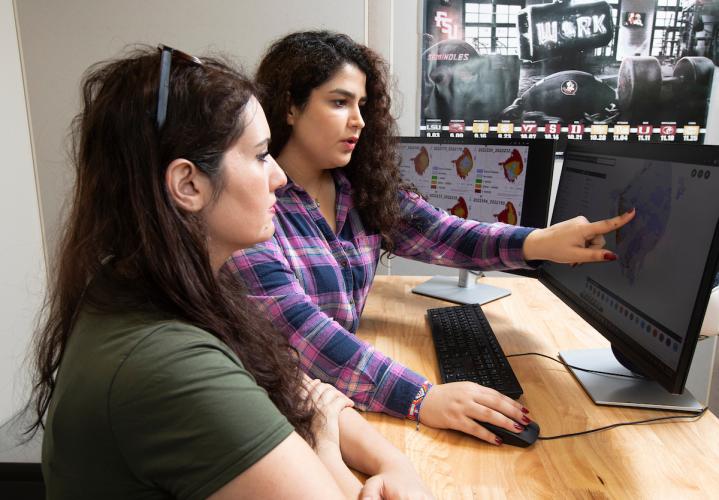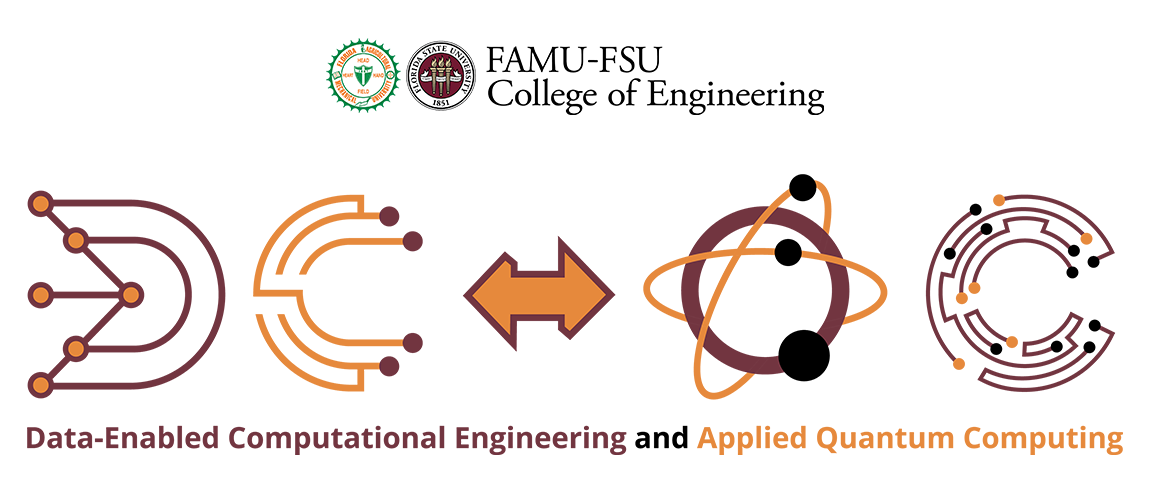
News and Success Stories
Research Focus
Research in Engineering Intelligence spans the full spectrum of discovery, design, and deployment across multiple engineering domains:
- AI-accelerated modeling and simulation using surrogate models, multiscale learning, and physics-informed neural networks to speed complex analyses and design.
- Intelligent materials and manufacturing applying machine learning for defect detection, process optimization, and performance enhancement in additive manufacturing and advanced materials.
- Autonomy and embodied intelligence integrating sensing, control, and adaptive learning in robotics, autonomous vehicles, and cyber-physical systems for safe, reliable operation.
- Infrastructure resilience and smart systems improving transportation safety, monitoring structural health, and enhancing energy grid reliability and disaster response.
- Environmental and natural systems leveraging predictive models and machine learning to forecast harmful algal blooms, improve water quality, and monitor ecological health.
- Computational and data infrastructure developing high-performance computing, secure data networks, and edge platforms that support scalable, trustworthy AI.
- Human–AI collaboration and decision systems combining human judgment with machine intelligence for design, manufacturing, and operational decision-making.
- Innovation, industry engagement, and workforce development translating discoveries into technologies, startups, and experiential learning opportunities that strengthen the engineering economy.
Students in the initiative engage directly in frontier research on AI-integrated engineering systems, participate in design challenges, internships with industry and labs, and collaborate on interdisciplinary teams that merge computational intelligence with hardware and physical models.

Course Offerings
In their future careers, students may work in areas that use or develop artificial intelligence and machine learning (AI/ML) methods and techniques for data analysis, code generation, prediction, optimization, and control – such as in the areas of robotics, self-driving cars, industrial automation, predictive maintenance, and smart grid management. At the FAMU-FSU College of Engineering, we believe it is necessary to equip our undergraduate students with the knowledge to use AI tools and methods for success in industry and delivering the next generation of solutions.
Prerequisites: COP 3014 and EE: 3705.
This course is an introduction to computer security: symmetric ciphers, public-key cryptosystems, digital signatures, hashes, message authentication codes, key management and distribution, authentication protocols, vulnerabilities and malware, access control, and network security.
Prerequisites: EEL 3135, MAS 3105, knowledge of Matlab and/or Python, and instructor permission.
This course is designed for senior undergraduate students from engineering disciplines and introduces students to the theory and engineering applications of machine learning including neural networks, fuzzy logic, genetic algorithms, supervised and unsupervised learning algorithms. This course places emphasis on engineering applications in controls, power systems, and robotics.
Prerequisites: COP 4530 and EEL 4021.
This course instructs students in basic artificial intelligence (AI) techniques of search, machine learning, natural language 6 of 12processing, robotics, and image processing. In this course, potential/current limitations are analyzed; as are human interaction in a decision-making environment.
Prerequisite: EGN 3443.
This course introduces fundamentals of big data analytics, including data loading, cleaning, transformation, visualization, predictive analytics, and data-driven decision making. An emphasis is placed on computer implementation using state-of-the-art data analytics language.
Prerequisites: This course is intended for undergraduate students who have taken COP 3014 Programming I - C++ or its equivalent.
Introductory course for undergraduate students to master high-level programming and database query languages for data extraction, transformation, and loading (ETL). Emphasis on utilizing computers to perform ETL operations relevant to industrial and systems engineering. Covers fundamentals of programming using a high-level language (such as Python) and introduces SQL for database management.
Prerequisite: EGN 3443.
This course is an introduction to quality and reliability engineering. This course examines statistical quality control techniques, process capability analysis, design and analysis of experiments for quality and reliability improvement.
Prerequisites: EGN 3443, ESI 3312, and MAS 3105.
This course is an introduction to machine learning geared toward advanced undergraduates or first-year graduate students.
Prerequisites: EGN 3443, ESI 3312C, and MAS 3105.
This course introduces three main neural networks (ANN, CNN, and RNN) and the realization in Python. Students learn the basics such as forward propagation, backward propagation, and gradient descent algorithms, as well as up-to-date neural network projects like (YOLO, VGG19, Resnet50, etc.).
Foundational courses offered at the college that could prepare students for later courses in machine learning include:
Prerequisite: EEL 3135.
This course covers topics such as sinusoids, periodic signals, and Fourier spectra. Sampling of continuous-time signals, aliasing. Impulse response of linear, discrete-time systems, convolution. FIR filters and implementation. Frequency response of FIR filters. Z-transforms, IIR filters, poles and zeros, frequency response. Realization of IIR filters. Discrete Fourier transform and the FFT algorithm. MATLAB exercises are assigned.
Prerequisite: MAP 2302.
This course is an introduction to image processing techniques, including theoretical development, analysis, and practical implementation. A project that includes implementation grounds the successful student in current engineering practice.
Faculty Research
Engineering Intelligence (EI): AI for Engineering and Engineering for AI is a college-wide effort involving faculty from multiple departments at the FAMU-FSU College of Engineering. The following list highlights faculty actively engaged in EI/AI research (not a complete list).
Chemical & Biomedical Engineering
- Jingjiao Guan — brain and AI (teaching), AI in statistics (teaching), immunoengineering, biomanufacturing
- Leo Liu — biofluid mechanics, mechanobiology, thrombosis/hemostasis, physics-informed machine learning
- Joshua Mysona — soft matter simulation, polymer physics, statistical physics and thermodynamics, molecular dynamics
- Ayyalusamy Ramamoorthy — MRI and NMR data analysis, nanodiscs technology, amyloid inhibitors for neurodegenerate diseases
- Scott Thourson — creating ML course for medical imaging, reforming teaching methods in AI age
Civil & Environmental Engineering
- Ebrahim Ahmadisharaf — flood prediction, analysis of satellite imagery, surface water quality modeling, impacts of weather on indoor air quality and respiratory health
- Nasrin Alamdari — harmful algal blooms, climate change adaptation, nature-based water treatment, sustainable infrastructure
- Gang Chen — land use change, nutrient management, watershed contamination, sustainable agriculture
- Maxim Dulebenets — operations research, optimization, supply chain management, scheduling, transportation engineering
- Pedro Fernandez-Caban — wind hazard mitigation, surface-level hurricane winds, civil infrastructure performance, structural optimization, coastal resilience
- Wenrui Huang — storm surge, wave modeling, estuarine salinity, water quality
- Sungmoon Jung — structural analysis and mechanics, wind engineering, AI-enabled design of structures
- Eren Ozguven — hurricanes, disaster resilience, critical infrastructure, roadway geometry characteristics
- Neetesh Sharma — CNNs for infrastructure inventory, Post-disaster recovery, Network flow
- John Sobanjo — transportation infrastructure, digital twins, pavement performance, bridge condition assessment, construction
Industrial & Manufacturing Engineering
- Raghav Gnanasambandam — digital twins, physics informed neutral network, scientific machine learning, surrogate modeling, and additive manufacturing
- Lichun Li — physics informed neural network, deep learning, game theory, dynamic systems, quantum computing
- Yanshuo Sun — operations research, big data analytics, transportation systems and logistics, supply chain management
- Arda Vanli — time series analysis, Bayesian analysis and infectious disease models applied for manufacturing process quality, disasters risk, public health and transportation
- Hui Wang — additive manufacturing, defect detection, process optimization, materials informatics
- Xinyao (Cynthia) Zhang — intelligent manufacturing, human-robot collaboration, data-driven machine learning, robotic learning and reasoning, and process optimization
Mechanical & Aerospace Engineering
- Jonathan Clark – robotics, legged locomotion, mechanical intelligence
- Suvranu De – deep learning for video-based assessment, foundation and time-series models for neuroimaging (EEG, fNIRS), intelligent artificial agents, explainable AI (XAI) and causal inferencing, AI-accelerated PDE solvers
- Ryan Gosse – compressible flows, space propulsion, applied AI
- Taylor Higgins – human/robot interactions, human motor control/biomechanics
- Christian Hubicki – robotics, applied control, reinforcement learning
- Carl Moore – robot-assisted manufacturing, intelligent machine design
- Unnikrishnan Sasidharan Nair – compressible flows, computational fluid dynamics
- William Oates – smart material device design, nonlinear control
- Camilo Ordóñez – mobile robotics, motion planning/control algorithms
- Juan Ordóñez – advanced power systems, thermodynamic optimization
- Kourosh Shoele – fluid-structure interaction, computational mechanics
- Huixuan Wu – multiphase flow, turbulence
- Neda Yaghoobian – atmospheric modeling, computational fluid dynamics

The DC-QC interdisciplinary graduate program equips students with cutting-edge computational and data-driven skills to solve complex engineering challenges, fostering collaboration and innovation across research fields. Leveraging cutting-edge engineering infrastructure and expertise, we aim to create a dynamic intellectual community that addresses complex engineering challenges on a local, national and global scale.
